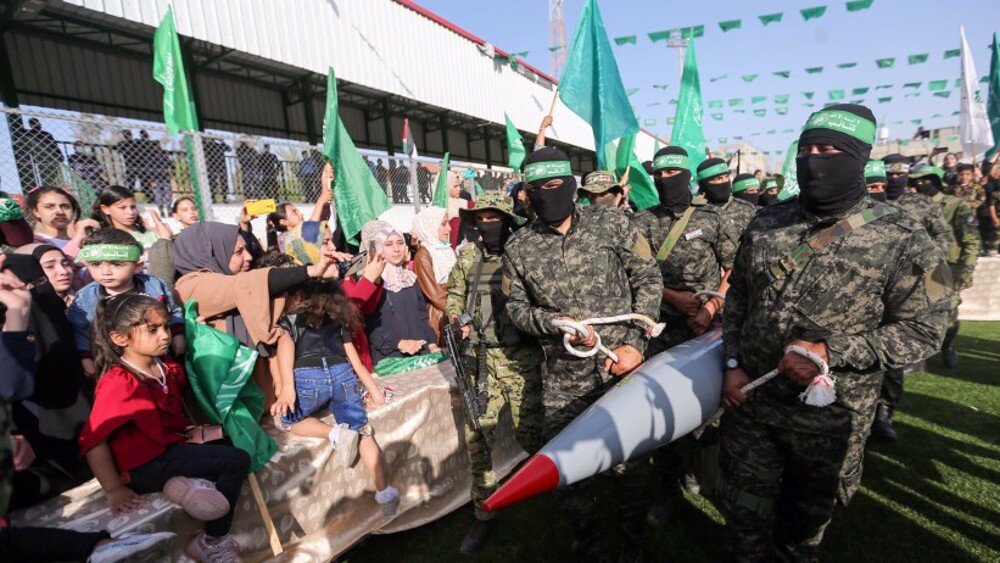Rise in Palestinian support for armed struggle
Research shows greater backing for Hamas after eight months of Israeli war on Gaza

TEHRAN- A survey by the Palestinian Center for Policy and Survey Research (PSR) shows support for Hamas and the armed struggle to end Israeli occupation rose over the last three months.
The Ramallah-based non-profit organization, which is funded mostly by the European Union, conducts surveys in the Gaza Strip and the occupied West Bank on a three-month basis.
The latest PSR publication covers a range of issues, many of which stand out by highlighting the will of the people who have endured almost nine months of daily Israeli bombardment, starvation, and the flattening of houses along with other war crimes committed by Tel Aviv in the Gaza Strip.
PSR points out that the data from the current poll and the one before it was collected during "the ongoing fighting in the Gaza Strip", while the first poll was conducted during the seven-day ceasefire agreement in November.
The poll was conducted between May 26 and June 1 and interviews were conducted in areas that included parts of Rafah and Khan Younis, the central Gaza Strip and all shelters in those regions as well as the West Bank.
Amid unprecedented human suffering in Gaza, where there is consensus among UN officials and experts that it is the most dire in modern history, the question of support for Palestinian factions is significant.
When asked which political party or movement they prefer, the largest number of Palestinians said the Gaza-based Hamas resistance movement. PSR said the results mean that support for Hamas over the past three months has increased by 6 percentage points.
In the same context, more than half of the respondents believe that Hamas is the most deserving of representing and leading the Palestinian people today while only 16% believe the Ramallah-based Fatah party under the leadership of Mahmoud Abbas is the most deserving.
Almost all Palestinians believe that "Israel is committing war crimes today", while support for Operation al-Aqsa Storm on October 7 remains high.
More than 90% believe that Hamas did not commit any atrocities against civilians on October 7.
The research shows more than 80% of Palestinians believe that the al-Aqsa Storm put the Palestinian issue at the center of attention and eliminated years of neglect at regional and international levels.
There has been an increase in the percentage of those who have lost relatives in this war to more than 60% and the results indicate that about 80% of Gazans say at least one of their family members has been killed or injured.
The findings point to an 8-percentage point rise in support for armed struggle to nearly one-third to establish a Palestinian state; and a 4-percentage point increase in support for non-violent resistance to nearly half.
The overwhelming majority of Gazans say they cannot access food or water and a majority say the pier established by the U.S. military on the coast of northern Gaza does not alleviate the suffering of the population through the delivery of humanitarian aid.
Nearly two-thirds blame the Israelis for their suffering, while most others blame the United States. Placing the blame on Hamas in the Gaza Strip does not exceed 8%.
This will come as a major blow to the government of Benjamin Netanyahu and his cabinet ministers.
Experts say Netanyahu's government strategy for more than eight months has been to starve the Palestinians in Gaza and make their lives hell so the population’s hatred of Hamas expands to the extent they overthrow the resistance movement, which the Israeli military has proven incapable of doing.
A majority said they expect Hamas to win the U.S.-backed Israeli war on Gaza, an increase of 4 percentage points compared to the previous PSR poll.
Almost no one in the West Bank expects the Israelis to win the war.
A large percentage of Palestinians in the West Bank say that the Gaza Strip will remain under Hamas’ control.
Opposition to the deployment of an Arab security force in the Gaza Strip stands at 75%.
Public satisfaction with the role played during the war by Palestinian, Arab/regional and international actors shows very high levels of satisfaction with Hamas and Yahya Sinwar, the group’s powerful leader in Gaza. By contrast, satisfaction with Fatah and Mahmoud Abbas continues to decline.
Satisfaction with Abbas' performance stands at only 12% and dissatisfaction at an overwhelming 85%.
About 90% want the president to resign. Today, 94% of West Bankers and 83% of Gazans demand the resignation of Abbas.
At a regional level, the highest satisfaction rate went to Yemen, Hezbollah, Qatar and Iran.
"Evident in this poll is the increase in satisfaction with Iran, by an additional 19 percentage points compared to three months ago," PSR stated. The organization speculates it is "probably due to Iran's direct missile attack on Israel in April."
The Palestinian public is also optimistic that student protests at American universities will change U.S. policy to make it more supportive of the Palestinian side or less supportive of the Israeli side, with about 70% believing this.
The poll found significant opposition to Saudi-Israeli normalization, even if it is conditioned on Tel Aviv accepting a Palestinian state and taking concrete and irreversible steps toward that goal.
